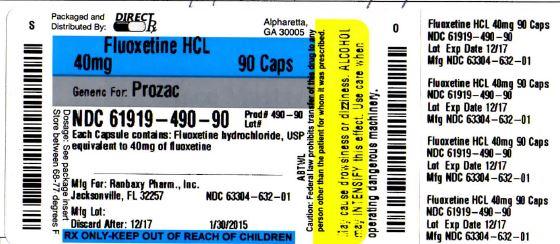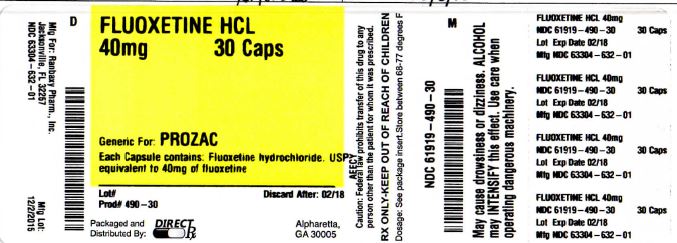
Fluoxetine Hcl | Fluoxetine Capsule while Breastfeeding
What is Fluoxetine Hcl | Fluoxetine Capsule used for?
Fluoxetine Hcl | Fluoxetine Capsule while breastfeeding safe or not? Can there be any side effects for infant while using it during breastfeeding?

Fluoxetine Hcl | Fluoxetine Capsule Breastfeeding Analsys
Fluoxetine while Breastfeeding
Low RiskCAS Number: 54910-89-3
Higher excretion into breast milk than other related antidepressant drugs. The active metabolite called Norfluoxetine has a longer half-life (4 to 16 days). Like other antidepressant drugs may induce hyperprolactinemia and galactorrhea. Few cases of colicky pain, irritability, insomnia, anorexia and slow weight gain have been described. However, most reported cases have failed to show harm effect outside the newborn period. Large experience with the use of Fluoxatine did not find harm effect on weight gain and neurological development of infants either at short or long term. Most problems have appeared in the early neonatal period either in newborns or premature infants whose mothers were on Fluoxetine during pregnancy. Stop or switch to other medication either at some days before delivery or in the first month postpartum would be recommended. Same considerations should be done in case of prematurity, however, medication must be continued if necessary. Women on anti-depressant treatment are in need of stronger support because of higher risk of breastfeeding failure.
Fluoxetine Hcl | Fluoxetine Capsule Breastfeeding Analsys - 2
Fluoxetine while Breastfeeding
CAS Number: 54910-89-3

The average amount of drug in breastmilk is higher with fluoxetine than with most other SSRIs and the long-acting, active metabolite, norfluoxetine, is detectable in the serum of most breastfed infants during the first 2 months postpartum and in a few thereafter. Adverse effects such as colic, fussiness, and drowsiness have been reported in some breastfed infants. Decreased infant weight gain was found in one study, but not in others. No adverse effects on development have been found in a few infants followed for up to a year. If fluoxetine is required by the mother, it is not a reason to discontinue breastfeeding. If the mother was taking fluoxetine during pregnancy or if other antidepressants have been ineffective, most experts recommend against changing medications during breastfeeding. Otherwise, agents with lower excretion into breastmilk may be preferred, especially while nursing a newborn or preterm infant. The breastfed infant should be monitored for behavioral side effects such as colic, fussiness or sedation and for adequate weight gain. Mothers taking an SSRI during pregnancy and postpartum may have more difficulty breastfeeding, although this might be a reflection of their disease state.[1] These mothers may need additional breastfeeding support. Breastfed infants exposed to an SSRI during the third trimester of pregnancy have a lower risk of poor neonatal adaptation than formula-fed infants.
I am nursing mother and I have already used Fluoxetine Hcl | Fluoxetine Capsule, what should I do?
Fluoxetine Hcl | Fluoxetine Capsule is in the category of low risk, if you have already used it then its not a big deal if health and behavior of baby is good. However your health care provider shall be aware of the fact that you have used Fluoxetine Hcl | Fluoxetine Capsule so you should inform him based on your convenience.
I am nursing mother and my doctor has suggested me to use Fluoxetine Hcl | Fluoxetine Capsule, is it safe?
Fluoxetine Hcl | Fluoxetine Capsule comes in category of low risk and if your doctor is aware that you are breastfeeding it should be ok to use
If I am using Fluoxetine Hcl | Fluoxetine Capsule, will my baby need extra monitoring?
Not much monitoring required while using Fluoxetine Hcl | Fluoxetine Capsule
Who can I talk to if I have questions about usage of Fluoxetine Hcl | Fluoxetine Capsule in breastfeeding?
US
National Womens Health and Breastfeeding Helpline: 800-994-9662 (TDD 888-220-5446) 9 a.m. and 6 p.m. ET, Monday through Friday
UK
National Breastfeeding Helpline: 0300-100-0212 9.30am to 9.30pm, daily
Association of Breastfeeding Mothers: 0300-330-5453
La Leche League: 0345-120-2918
The Breastfeeding Network supporter line in Bengali and Sylheti: 0300-456-2421
National Childbirth Trust (NCT): 0300-330-0700
Australia
National Breastfeeding Helpline: 1800-686-268 24 hours a day, 7 days a week
Canada
Telehealth Ontario for breastfeeding: 1-866-797-0000 24 hours a day, 7 days a week
